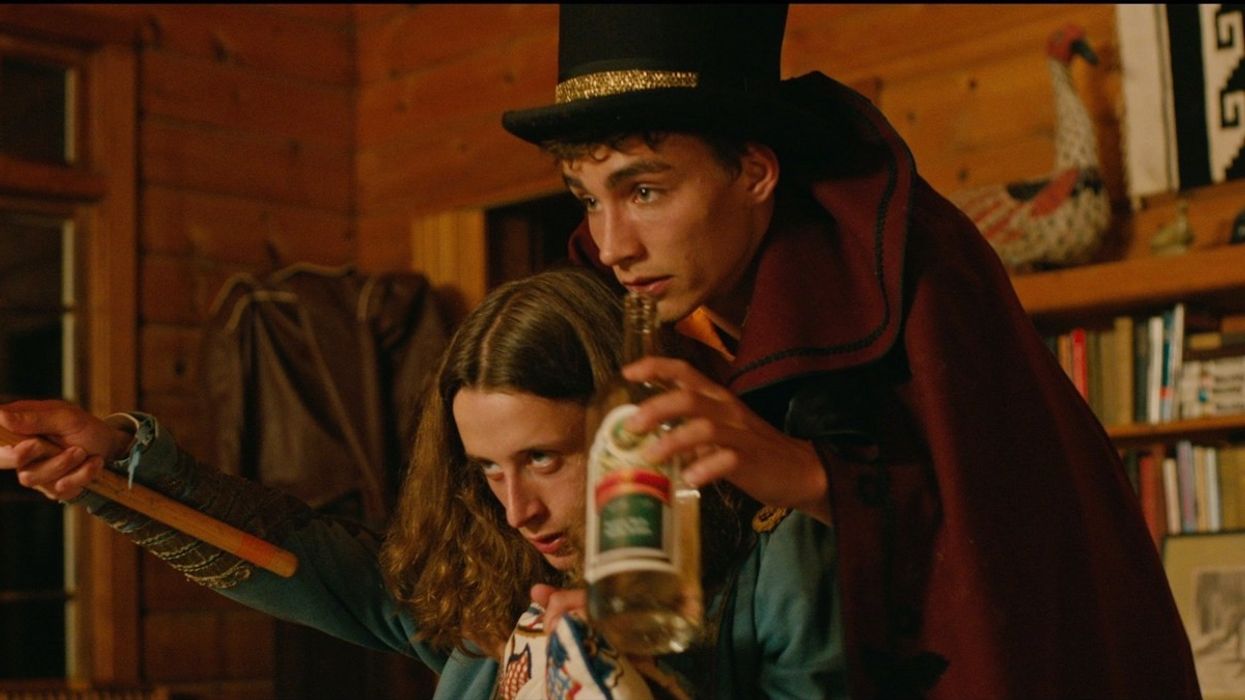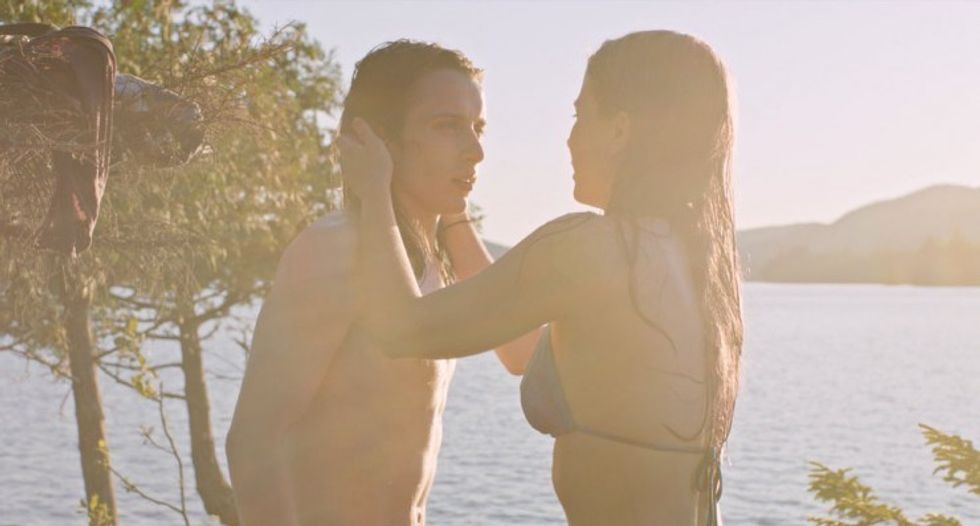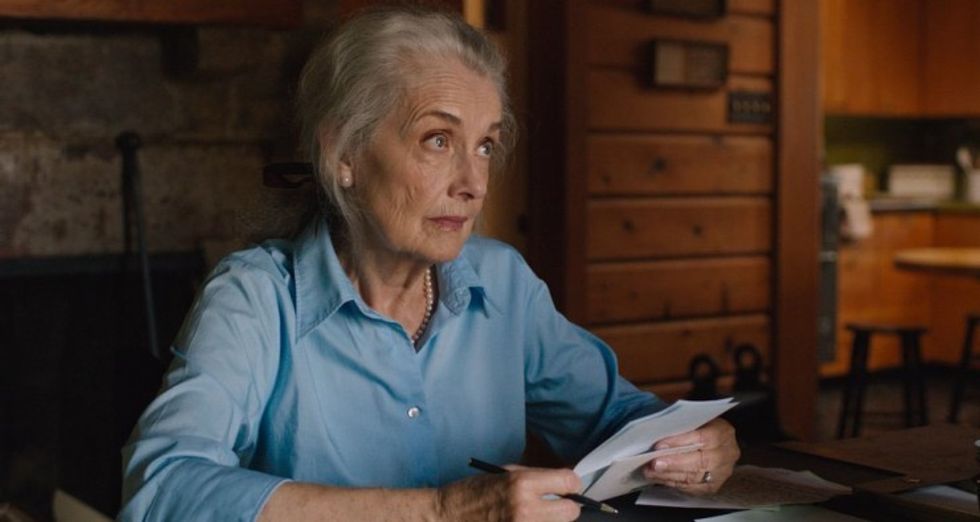'If You Write A First Draft Slowly, I Think You Can Overthink Yourself': 'The Song of Sway Lake" Director Ari Gold on Finding Your Story
For Ari Gold, thinking ahead was crucial for 'The Song of Sway Lake.'

Director Ari Gold's newest film,The Song of Sway Lake, could be considered a historical tone poem. Set in the 1990s, it looks back, in its references and music (and to a certain extent its approach) to an earlier era.
Ollie Sway (Rory Culkin), the semi-hero of the film, has come to his family's mansion on Sway Lake in upstate New York, to steal a rare album, sort of for the money, sort of for the action of just doing it. He's brought a sidekick, a garrulous and thoroughly untrustworthy friend named Nikolai (Robert Sheehan) to get the job done.
Once there, the job becomes a bit more complicated than expected. Ollie's father committed suicide prior to the start of the film, which casts a complex and heavy shade over the story; Ollie's grandmother shows up not long after the boys arrive and is trying to determine what to do with the house (and also looking for the album). While the album contains a song about Sway Lake, it's also a vessel for a number of other things.
Gold has invested a lot of care and energy in pure mood; the music (with songs and other tracks composed by the director's brother, in homage to an earlier sound), the often-rapt cinematography, and the intense acting make the film a rare and interesting experience. No Film School caught up with Gold to discuss how and why he made this movie.
No Film School: What image or moment prompted you to write this story and this screenplay?
Ari Gold: Well, it started with the idea of water. That sounds cheesy, but I knew, and my co-writer Liz Bull knew, that we wanted to make something in the Adirondacks on this lake called Blue Mountain Lake. We were influenced by Éric Rohmer and his simple 60s and 70s movies about summer on a lake, usually with five characters. We knew that, but we didn't know what it would be until, actually, the end of the editing process.
We knew we wanted it to be sexy. We wanted there to be music, which there isn't in Éric Rohmer movies, usually. We knew that it was a story of friendship between two young men and obsession with women—one younger woman and one woman in her 70s that these two young men love—and an obsession with the past through music from the 1940s. We then discovered more as we went.
NFS: How long would you say the writing process was for the screenplay itself?
Gold: The first draft was pretty quick. I think it was about 2 months, but you know, a first draft is really a first draft. Liz and I dated for years before we broke up and then became writing partners. So, we were talking about the story in some vague way for quite a while. And then when we sat down to write, we were very militant with each other in terms of getting the pages out.
I know that if you write a first draft slowly, you overthink yourself and you go into your brain. If you write your first draft quickly, you start going into your subconscious, and you have to use your brain intensely to make sense of what you've done.
I really am a believer in a quick first draft, if it's possible. So, we did our best to write quickly and we were fighting with each other all the time, in a kind of lovely, artistic way, about what direction to take the story and what tone it should have.
NFS: One thing that really appealed to me was that it feels like an old-fashioned story in the best sense of the word. It's about timeless themes: love, poverty, inheritance, legacy. I'm wondering if those things were in your mind when you were working on it and also to what extent you felt inclined to push away from those older ideas, because there's certainly a lot of revision in there as well.
Gold: I think we didn't have the notion of legacy firmly in our minds when we wrote it. We knew that there was a kind of emotional legacy in terms of people who are obsessed with the past, obsessed with music from the 40s, obsessed with the old lake that used to be glamorous and now is still beautiful but not glamorous, per se.
That was all in our minds, in the course of editing it and also working with my brother, the composer. When we wrote it and when we shot it, the characters were looking for a rare recording of a Cole Porter song. My brother said, "Hey, why don't I compose a song about Sway Lake? So that the song they're looking for really has never been heard before?" And when he suggested that, this notion of legacy became a lot bigger.
Imagine if you grew up going to a lake that was named after your grandparents, and with this famous song that was sung about the lake, and you were just this kid, who's probably living in an East Village squat. You have the weight of history on you and you can't live up to it. To know you could have not been able to live up to another generation is something that all the kids have really responded to, and that I get.
A lot of older audiences whose parents were war heroes or fought in World War II have this idea that the generation that came back from World War II could not be lived up to. So, their kids went crazy. Their kids were the baby boomers who rebelled in the 60s and those who maybe didn't rebel, like the fictional father of Rory Culkin’s character, kind of closing in on themselves because they just couldn't live up to their parents.
The grandson is wondering, "How do I rewrite myself in a world that is so beautiful and so glamorous and so gone?" And so he brings this Russian who's just come from the collapse of the Soviet Union, which is its own legacy, and he's thinking, "America! This is amazing!" So, it really became about legacy, in some ways that we did not predict when we were writing it on paper.
"If you write a first draft slowly, I think you overthink yourself and you go into your brain. If you write your first draft quickly, you start going into your subconscious, and you have to use your brain intensely to make sense of what you've done."
NFS: History is made real in the movie by the presence of all OF this memorabilia. The photographs, and the records, and everything in that huge house. All those artifacts and different objects...where did they come from?
Gold: That’s the reason the film took years to make. There were a lot of artifacts in that house where we shot, but they were general artifacts. Everything that you see in close-up, all the old letters, the old photographs, all of that was either created or pulled from my own family. The wedding of the Sways from 1940 is just a crazy luck thing; when my grandparents’ house was being sold by my uncles and aunt, they found a bunch of boxes.
They said, "Well, there's a lot of junk here we don't want" and my aunt said, "Oh, there's some film." I took a reel, and I looked at it, and it was my grandparents’ wedding, in color, amazingly, from 1940. The other stroke of luck was casting Mary Beth Peil, who is such a trooper and would shoot at 5AM without blinking an eye.
The pictures of my young grandmother worked to suggest the young Charlie Sway, and so I was able to use them, and then, as for the letters, we created them. We typed them on a typewriter and filmed them. Yeah, that was a whole giant process after shooting the movie. All the closeups later, I did in my apartment.
"We knew that we couldn't have people smell the lake when they see the movie, but we wanted them to smell it."
NFS: The other question I had was about Nikolai. He's an interesting figure in this film because he's sort of, to me, a free radical.
Gold: Right. He’s an enzyme.
NFS: He's certainly independent from the family, but at the same time he draws a certain amount of energy from the family and away from it, it seems. Was he there from the beginning?
Gold: Absolutely. He was there from day one. We knew that we wanted to create this male bonding with the odd couple of the depressed grandson and the wild wannabe Zorba the Greek from Russia, who's like, "Let's tear it up. Let's meet girls. Let's steal the record." The friction of that kind of male friendship is something a lot of guys get when they see the movie.
Everyone's had a friend that they've helped along to try to get out of their shell on that side. Everyone has also been on the other side, where they're the one who needs to be helped and they look up to a kind of wild lion as a friend—not necessarily knowing that the lion might bite your head off.
I've had friendships like that, and I also have a friend who's Russian, and still a very good friend, and he consulted with Robert Sheehan to get the whole physicality and Russian-ness right. Sheehan was the only actor who had the spirit to pull off the sexual charisma of the character at the same time as the completely ridiculous comedy of him. He can be kind of menacing in once scene and then totally lovably ridiculous in another scene and then annoying to his best friends in another scene. He walks that line so beautifully in the movie.
"Eric Lin, the DP, and I, drew pictures for every single shot in the movie, way in advance."
NFS: At certain moments, the film reminded me of certain John Sayles movies, for instance, Sunshine State, and there's also the connection with Lone Star and Elizabeth Peña, obviously, but I was wondering how you viewed the social dimension of the movie. In the director's notes, you mentioned America's fallen grace. What do you consider the social impact of a movie like this to be?
Gold: On a social level, we’ve played 45 festivals, and I've been really pleased with how many people respond to the social aspect. It's before cellphones, before the Internet. It's a period piece, but then it's a double period piece, because all of those characters are thinking about the 1940s, which, in their minds, was a time of heroes, a time of men taking off their hats for women.
All that's long-gone, and you have this wealthy family that's declining in wealth. There's a friction between that family and the locals on the lake who are like, "Hey, we want to bring jet skis on here. We wanna bring tourists. We don't care if there's gasoline pouring into the pure water that you brag about swimming naked in with your husband 50 years ago." That's something the Russian plays with too, because he's idealized America. He's talked about World War II with the grandmother and he curses in front of her to see if she's going to react. The grandson is furious because he's watching his friend flirt in this outrageous way with his grandmother and get away with it. When he knows that if he were to say a curse word in front of his grandmother, his head would get torn off. But the good-looking Russian guy can say "America crushed those fucking Germans," and he gets away with it.
The music is a big part of that, too. I was fortunate that I know Lars Ulrich from Metallica and he let me use the song “Battery.” There's a scene where Rory Culkin is worshiping this music from the 1940s, and he gets in this girl's car and she’s blasting Metallica. And so there's musical tension as well.
NFS: I was really drawn to the cinematography. Could you talk a little bit about how you worked with the cinematographer to develop a visual approach?
Gold: In this case, we knew that we couldn't have people smell the lake when they see the movie, but we wanted them to smell it. So the visuals were crucial from way before we started. We also knew that we wanted the film to feel like an old-fashioned movie in some ways, so there's not a lot of camera movement and yet it doesn't feel static at all. I studied a lot of older movies, from when cameras were a lot heavier and they couldn't fly them around that much.
Eric Lin, the DP, and I, drew pictures for every single shot in the movie way in advance. Now, of course, we changed stuff on set. We would discover things, or we would run out of time, so we'd have to combine shots, but we knew that we had a story visually in advance. There was a lot of mathematics having to do with the power dynamics between the characters. Say we're sitting at a dinner table in this beautiful house, Where does someone sit? How do you show with an eyeball flick that somebody's jealous? We were able to go to the location a month in advance and draw every single picture and crawl around on the floor and try all the camera positions. I can't imagine we could have shot a low-budget film if we had showed up on set and had to improvise. I'm sure we'd have come up with something, but in this case, nothing was to be left to chance.













